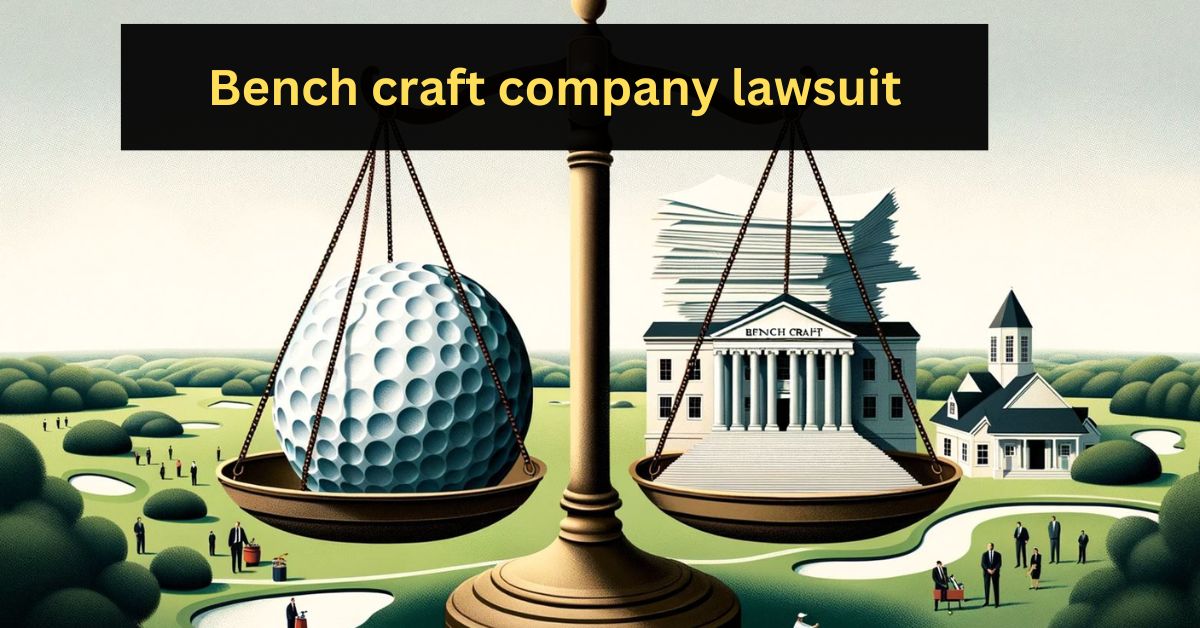
Bench craft company lawsuit
In the dynamic landscape of marketing and advertising, businesses often tread a fine line between success and legal challenges.
One such company that has recently found itself in the midst of controversy is Bench Craft Company, Inc.
This article aims to provide a comprehensive understanding of the Bench Craft Company lawsuit, exploring its origins, key allegations, legal proceedings, and the potential implications it holds for small businesses.
Understanding Bench Craft Company:
Before delving into the legal intricacies, it’s crucial to grasp the nature of Bench Craft Company.
Established in 1982, Bench Craft initially focused on the outdoor market, specializing in golf course advertising through signs and printed materials.
Over the years, the company expanded its offerings, catering to small businesses and local advertisers by providing advertising opportunities on golf course scorecards and related materials.
The Origins of the Lawsuit:
The Bench Craft Company lawsuit stems from a series of alleged deceptive and fraudulent business practices.
Small-scale business owners, primarily golf course operators, filed a class-action lawsuit against the company in 2018.

The legal dispute spans multiple states, creating a complex and extensive web of allegations and responses.
Key Allegations:
The lawsuit against Bench Craft Company revolves around several key allegations, including:
- Misleading Business Practices: Claims of misrepresentation of the potential audience for advertising, leading businesses to invest based on inflated projections.
- Breach of Contract: Allegations that Bench Craft utilized high-pressure sales tactics and deceptive contracts, locking businesses into long-term agreements.
- Customer Complaints: Complaints regarding the failure to deliver promised advertising and marketing services, with businesses stating they did not receive the expected return on investment.
Legal Proceedings Unveiled:
The legal proceedings against Bench Craft Company took the form of a class-action lawsuit, with multiple small-scale business owners joining forces to address shared grievances.
The company vehemently denied the accusations, claiming their advertising services provided value and any discrepancies were due to external factors.
Implications for Small Businesses:
The Bench Craft Company lawsuit serves as a stark reminder of the potential challenges small businesses may face when entering into advertising contracts. Some notable implications include:
- Potential Financial Impact: Small businesses may face financial repercussions if embroiled in legal disputes, impacting their operational stability.
- Reputation Damage: Negative publicity from legal battles can harm the reputation of small businesses, potentially leading to customer distrust.
The Company’s Response:
Bench Craft Company responded by denying all allegations, asserting that they provided valuable advertising services and any issues were isolated incidents or misunderstandings.
The company’s defense strategy included highlighting their track record of success and the value they purportedly brought to golf courses.
Analyzing Public Opinion:
The public’s response to the Bench Craft Company lawsuit has been diverse, with opinions shaped by media coverage, social media discussions, and the company’s official statements.
Analyzing public sentiment reveals a mix of skepticism, concern, and support for the affected small businesses.
Social Media Outcry:
Social media platforms became a battleground for discussions surrounding the lawsuit. Users expressed their opinions, shared personal experiences, and engaged in conversations about the ethical considerations of advertising practices.
Media Coverage:
Media outlets played a crucial role in shaping public perception. Balanced reporting, investigative journalism, and interviews with affected businesses contributed to the narrative surrounding the lawsuit.
Similar Cases in the Industry:
The Bench Craft Company lawsuit is not an isolated incident in the advertising industry. Similar cases have emerged, shedding light on the challenges and controversies inherent in marketing and advertising practices.

The Complexity of Advertising Laws:
Navigating the legal landscape of advertising involves complexities, especially regarding contract terms, representations, and the enforcement of fair business practices.
Gray areas and challenges often arise, making it essential for businesses to operate within legal boundaries.
Regulatory Compliance:
The lawsuit against Bench Craft Company also attracted regulatory attention, prompting investigations into potential violations of consumer protection laws.
Regulatory bodies in several states scrutinized the company’s practices to determine compliance with existing laws.
Navigating Legal Jargon:
Understanding the legal documents and terminology involved in the Bench Craft Company lawsuit is crucial.
Small businesses, when faced with legal challenges, must seek legal counsel to navigate the complexities of court proceedings and potential settlements.
Breaking Down Legal Terms:
Legal terms such as “class-action lawsuit,” “misrepresentation,” and “regulatory compliance” can be daunting for small business owners.
Breaking down these terms simplifies the understanding of the legal aspects surrounding the Bench Craft Company case.
Understanding Court Documents:
Interpreting court documents, including complaints, responses, and settlements, requires a level of legal comprehension.
Seeking assistance from legal experts ensures small businesses fully grasp the implications of such documents.
The Future of Bench Craft Company:
As the lawsuit progresses, the future of Bench Craft Company remains uncertain. The outcome will likely have lasting effects on the company’s operations, industry reputation, and the broader landscape of advertising practices.

Lessons for Small Business Owners:
The Bench Craft Company lawsuit offers critical lessons for small business owners entering into advertising agreements:
- Due Diligence: Thoroughly research advertising partners, review contracts, and seek legal guidance before committing to agreements.
- Transparency and Ethics: Prioritize transparency and ethical conduct in advertising practices to build trust with customers and avoid legal complications.
Seeking Legal Counsel: What to Consider:
Small businesses facing legal challenges should consider several factors when seeking legal counsel:
- Choosing the Right Attorney: Select an attorney with expertise in the specific legal area relevant to the case, ensuring they understand the nuances of advertising law.
- Costs and Benefits: Evaluate the costs and benefits of legal representation, considering potential financial implications and the overall impact on the business.
Conclusion:
The Bench Craft Company lawsuit illuminates the complexities of legal disputes in the advertising industry.
Small businesses should heed the lessons learned, prioritize ethical practices, and seek legal guidance to navigate the intricate landscape of advertising agreements.
As the legal proceedings unfold, the implications for Bench Craft Company and the advertising industry at large will undoubtedly shape the future landscape of business practices and regulatory compliance.
FAQ’s:
Q1. How did the Bench Craft Company Lawsuit impact its competitors in the golf course advertising industry?
The specific impact on competitors is not explicitly detailed in available information. However, legal actions within an industry can potentially raise awareness about business practices, prompting competitors to review and strengthen their own policies.
Q2. Were there any regulatory changes or industry guidelines proposed as a result of the Bench Craft Company Lawsuit?
Information on regulatory changes or new industry guidelines resulting directly from the lawsuit is not available. Regulatory bodies may, however, examine such cases to assess the need for adjustments in existing regulations.
Q3. What measures did Bench Craft Company take to enhance transparency and ethical practices after the lawsuit?
While there is information about Bench Craft settling certain cases and implementing changes, specific details about enhanced transparency and ethical practices post-lawsuit are not provided. Companies often make internal adjustments after legal challenges to address concerns.
Q4. Did the Bench Craft Company Lawsuit lead to any consumer awareness campaigns or initiatives in the advertising industry?
There is no information suggesting that the lawsuit directly triggered consumer awareness campaigns or industry initiatives. However, such legal actions can indirectly contribute to discussions about consumer rights and ethical advertising practices.
Q5. Were there any noteworthy endorsements or criticisms from industry experts regarding Bench Craft Company’s post-lawsuit actions?
Specific endorsements or criticisms from industry experts regarding Bench Craft Company’s actions after the lawsuit are not highlighted in the available information. Public responses from experts can vary and may not be explicitly documented.
Q6. How did Bench Craft Company communicate changes to its advertising practices to the public following the lawsuit?
Details about Bench Craft Company’s communication strategy regarding changes in advertising practices post-lawsuit are not provided. Companies often use various channels, such as press releases or updated terms and conditions, to convey such information.
Q7. Did the Bench Craft Company Lawsuit influence any legislative discussions related to advertising practices or consumer protection?
Information about the lawsuit directly influencing legislative discussions is not available. However, high-profile legal cases can sometimes contribute to broader conversations about the need for regulatory adjustments in the industry.
Also Read:
- ovestæ – Types & Key Characteristics In 2023
- sls lifestyle – Know The Key Components In 2023
- Understanding Integremos: Revolutionizing Business Integration In 2023
- Introduction Escapism Lyrics – Get Free Lyrics In 2023
- chrisley knows best daughter dies
Mrsola33
You May Also Like

VSCO People Search: Finding Friends and Influencers
February 14, 2024
18 year old tianas sweet fresh cookies
December 9, 2023
Average Rating